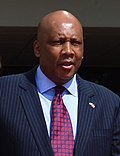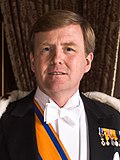
| Part of a series on |
| Imperial, royal, noble, gentry and chivalric ranks in Europe |
|---|
 |
King is a royal title given to a male monarch. [1] In a modern context, the title may refer to the ruler of one of a number of modern monarchies (either absolute or constitutional). [2] [3] A king is an absolute monarch if he holds unrestricted governmental power or exercises full sovereignty over a nation. The title of king is used alongside other titles for monarchs: in the West, emperor, grand prince, prince, archduke, duke or grand duke, and in the Islamic world, malik, sultan, emir or hakim, among others. [4]
Contents
The term king may also refer to a king consort, a title that is sometimes given to the husband of a queen regnant, but the title of prince consort is more common.


















